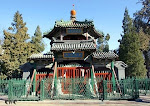It's always fascinated me how over a billion people live in a single large country like China. Even more fascinating is the existence of dozens upon dozens of varying ethnic groups and cultures within this bordered off land. Their interactions with each other, be it co-existence or conflict, and the history behind these trends is also quite interesting to read up on. I think it'd be fair to argue that the situation with the ethnic Uighur group in China and their conflict with the Han Chinese has received considerably more worldwide media attention in our post-9/11 world than it was in our pre 9/11 times. I would say this is because our post-9/11 world has, understandably, developed a greater interest in all things 'Islamic'.
The ethnic tensions, according to Perdue and Millward, has been there for a number of centuries, since the time Islam found its way to the region via Arabian and Persian merchants. While Muslims can be found in various regions around the country, it is the minority majority Uighur group in the Xinjiang province that has been under considerable focus. Ethnic tensions between the Uighur and Han-Chinese dates back for many centuries, with the Uighur constantly striving for independence. Unsurprisingly, such tensions have only degraded into violence over and over again - we've seen riots this past summer and, more recently, the rising spat of attacks by hypodermic needle-wielding citizens in the city of Urumqi. It's obvious enough that Human Rights activists and the Uighur themselves would love nothing more than to gain their independence, but given the long drawn out history that surrounds this ethnic group and their relation with the Han-Chinese, I highly doubt that we'll be seeing any sort of progress any time soon. Certainly not on their own, at least.
The Xinjiang region has been a volatile one, undergoing political and social tensions. On their own, the Uighur don't stand a chance, at least under more violent or aggressive methods. Given that we're in a post-9/11 world where violence + Islam has, in general, drawn an immediate association with militant terrorism, it's understandable that most would be reluctant to side with the Uighur, or find it easy to condone any violent acts of resistance. Not only that, China's position as a growing world power would make any country who could have any sort of influence (such as the US) reluctant to take any sort of action....of course, there's also the fact that taking any sort of action would probably give them no direct benefit to begin with anyway.
In either case, it'll be interesting to see how the current situation plays out, most especially in the politically explosive age that we're currently living through.
Wednesday, September 16, 2009
Subscribe to:
Post Comments (Atom)





No comments:
Post a Comment